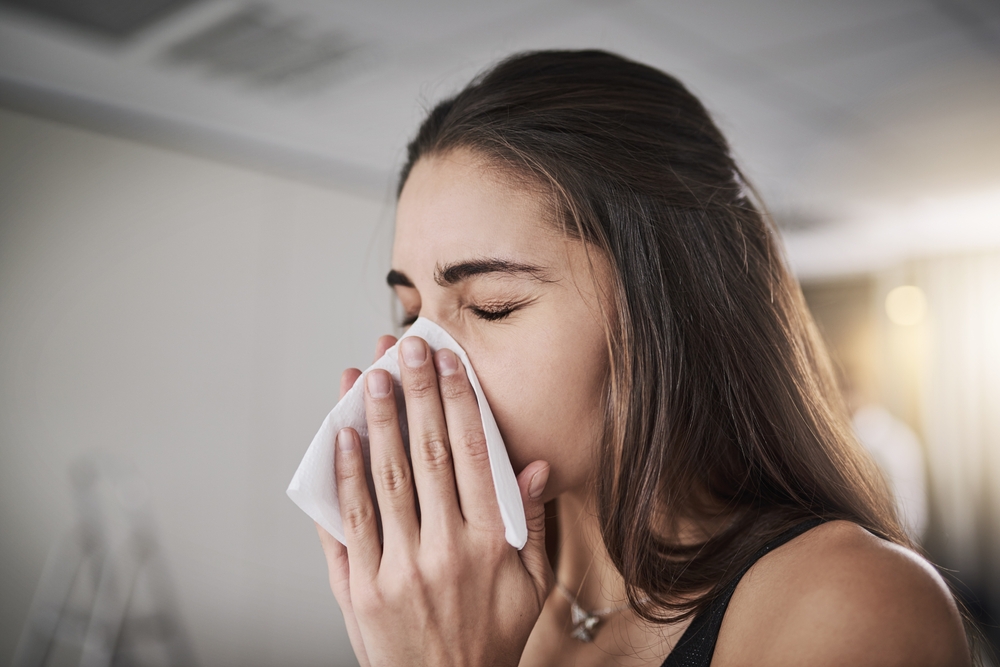Post nasal drip is a common issue that occurs when excessive buildup of mucus collects at the back of the throat. This mucus can cause a persistent tickling sensation, leading to frequent throat clearing, coughing, or even a sore throat. While the condition isn’t usually serious, it can be uncomfortable and frustrating. Many people experience post nasal drip at some point, whether due to allergies, colds, or other factors.
If you’ve been dealing with this annoying issue, it’s essential to understand the triggers, signs, and effective treatments available to help relieve post nasal drip.
Common triggers of post nasal drip
Our bodies naturally produce mucus to help keep our respiratory system moist and protected. However, when the production of mucus increases, it can lead to post nasal drip.
Many triggers can contribute to this overproduction of mucus, including:
- Allergies: Pollen, dust, pet dander, and other allergens can cause inflammation in the nasal passages, which increases mucus production.
- Sinus Infections and Colds: Both viral and bacterial infections often lead to inflammation in the sinuses, causing excess mucus buildup.
- Environmental Factors: Cold or dry air can aggravate the nasal passages, increasing mucus production. Exposure to airborne irritants such as smoke or pollution can have a similar effect.
- Hormonal Changes: Pregnancy, in particular, can result in elevated mucus production due to hormonal shifts.
- Spicy Foods: Consuming spicy foods may temporarily increase mucus flow.
- Medications: Certain medications, such as birth control pills and medications for high blood pressure, can trigger post nasal drip as a side effect.
- GERD (Gastroesophageal Reflux Disease): This condition causes stomach acids to back up into the throat, stimulating mucus production.
- Aging: As we age, our body’s mucus production may increase, contributing to post nasal drip.
Recognizing the signs of post nasal drip
Post nasal drip can cause a variety of symptoms, the most common being:
- Persistent Sore Throat: A scratchy or irritated throat from the constant presence of mucus.
- Frequent Throat Clearing: A consistent need to clear your throat due to mucus buildup.
- Excessive Swallowing: Swallowing more often to try and clear mucus from the back of the throat.
- Bad Breath: The accumulation of mucus can lead to unpleasant odors in the mouth.
- Coughing: Often worse at night, when mucus tends to accumulate in the throat.
- Ear Pressure: Blocked Eustachian tubes, which connect the middle ear to the throat, can result in ear pain or infections.
In rare cases, post nasal drip can cause nausea or vomiting due to mucus entering the stomach, particularly if left untreated.
Treatment options for post nasal drip
There are several ways to treat and manage post nasal drip. Treatments can range from simple home remedies to prescription medications, depending on the severity of the condition.
Home remedies
Start with home remedies that can help you find relief:
- Focus on Hydration: Consuming lots of fluids, especially water and hot teas, can help thin mucus and make it easier to expel.
- Avoid Dehydrating Drinks: Minimize caffeine and alcohol consumption, as these can dehydrate you and make mucus thicker.
- Use a Humidifier: Having more moisture in the air can help keep mucus from becoming too thick and sticky.
- Nasal Irrigation: Using a saline nasal rinse or neti pot can help clear mucus and allergens from the nasal passages.
- Sleep with Your Head Elevated: Sleeping with your head propped up can help mucus drain more effectively and prevent it from accumulating in your throat.
- Warm Compress: Applying a warm compress to your face can relieve sinus pressure and loosen mucus.
- Herbal Teas: Drinking warm herbal teas like peppermint or chamomile may help soothe the throat and ease congestion.
Over-the-counter (OTC) medications
If home remedies don’t fully alleviate symptoms, over-the-counter medications can provide additional relief:
- Decongestants: Medications like Sudafed can reduce nasal congestion and mucus buildup. However, they should only be used for short periods due to potential side effects.
- Antihistamines: Antihistamines like Zyrtec, Claritin, and Allegra can help alleviate allergy-related post nasal drip by reducing the body’s reaction to allergens.
- Mucolytics: Medications such as Mucinex help thin mucus, making it easier to clear from your throat.
- Cough Suppressants: If post nasal drip leads to a persistent cough, medications like Robitussin DM may help suppress coughing.
Prescription medications and treatments
For chronic or severe cases, prescription medications and treatments may be necessary:
- Prescription Nasal Sprays: Steroid nasal sprays like Flonase or Nasonex can reduce inflammation and mucus production in the nasal passages.
- Antibiotics: If a bacterial infection is causing post nasal drip, a doctor may prescribe antibiotics to address the underlying infection.
- Allergy Shots (Immunotherapy): If allergies are the main trigger, allergy shots can help reduce the body’s sensitivity to allergens, providing long-term relief.
- Gastroesophageal Reflux Disease (GERD) Medications: If GERD is contributing to post nasal drip, medications like proton pump inhibitors (PPIs) or H2 blockers may be prescribed to reduce acid reflux and its effects on the throat.
How to prevent post nasal drip
In addition to treating post nasal drip, it’s important to take steps to prevent it from recurring. Here are a few tips:
- Avoid Allergens: If you know you’re allergic to specific substances, do your best to avoid them.
- Maintain a Clean Home: Regularly cleaning your home and reducing dust, mold, and pet dander can help prevent irritation.
- Change HVAC Filters Regularly: Clean air circulation is important for reducing environmental irritants that can contribute to post nasal drip.
- Use Daily Allergy Medications: If you suffer from seasonal allergies, consider using daily allergy medications to prevent symptoms.
- Shower at Night: Showering before bed can help remove allergens from your skin and hair, preventing them from triggering post nasal drip.
When to see an ENT specialist
If post nasal drip becomes chronic or severe, or if over-the-counter treatments are no longer effective, seeking the help of an ENT specialist is recommended. They can help determine the cause of your symptoms and offer solutions to get relief, whether through medications, targeted treatments, or diagnostic testing.
Find an ENT specialist near you if you are suffering from post nasal drip and at-home and over-the-counter remedies aren’t helping.



